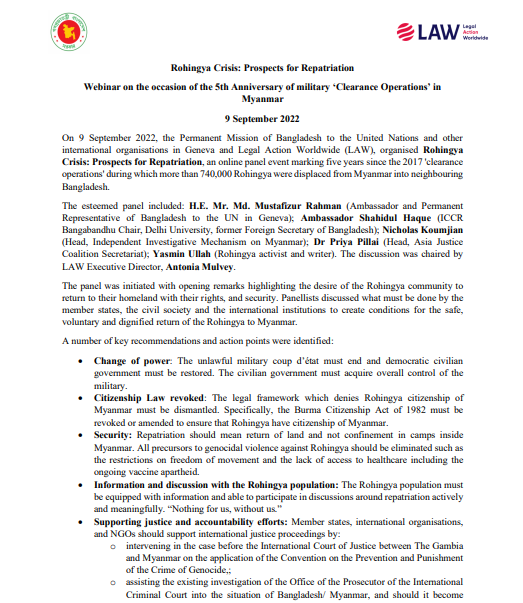LAW Co-hosts “Rohingya Crisis: Prospects for Repatriation” webinar
On 9 September 2022, the Permanent Mission of Bangladesh to the United Nations and other international organisations in Geneva and Legal Action Worldwide (LAW), organised Rohingya Crisis: Prospects for Repatriation, an online panel event marking five years since the 2017 ‘clearance operations’ during which more than 740,000 Rohingya were displaced from Myanmar into neighbouring Bangladesh.
The esteemed panel included: H.E. Mr. Md. Mustafizur Rahman (Ambassador and Permanent Representative of Bangladesh to the UN in Geneva); Ambassador Shahidul Haque (ICCR Bangabandhu Chair, Delhi University, former Foreign Secretary of Bangladesh); Nicholas Koumjian (Head, Independent Investigative Mechanism on Myanmar); Dr Priya Pillai (Head, Asia Justice Coalition Secretariat); Yasmin Ullah (Rohingya activist and writer). The discussion was chaired by LAW Executive Director, Antonia Mulvey.
The panel was initiated with opening remarks highlighting the desire of the Rohingya community to return to their homeland with their rights, and security. Panellists discussed what must be done by the member states, the civil society and the international institutions to create conditions for the safe, voluntary and dignified return of the Rohingya to Myanmar.
A number of key recommendations and action points were identified
- Change of power: The unlawful military coup d’état must end and democratic civilian
government must be restored. The civilian government must acquire overall control of the
military. - Citizenship Law revoked: The legal framework which denies Rohingya citizenship of
Myanmar must be dismantled. Specifically, the Burma Citizenship Act of 1982 must be
revoked or amended to ensure that Rohingya have citizenship of Myanmar. - Security: Repatriation should mean return of land and not confinement in camps inside
Myanmar. All precursors to genocidal violence against Rohingya should be eliminated such as
the restrictions on freedom of movement and the lack of access to healthcare including the
ongoing vaccine apartheid. - Information and discussion with the Rohingya population: The Rohingya population must
be equipped with information and able to participate in discussions around repatriation actively
and meaningfully. “Nothing for us, without us.” - Supporting justice and accountability efforts: Member states, international organisations,
and NGOs should support international justice proceedings by:
–intervening in the case before the International Court of Justice between The Gambiaand Myanmar on the application of the Convention on the Prevention and Punishmentof the Crime of Genocide;
–assisting the existing investigation of the Office of the Prosecutor of the International Criminal Court into the situation of Bangladesh/ Myanmar, and should it become possible, by referring of Myanmar to the International Criminal Court;
–supporting, strategically and with caution, universal or extraterritorial jurisdiction initiatives in domestic courts.
- Increased regional and international pressure: Member states, including both global
superpowers and countries within the region, as well as international organisations, including
ASEAN, should maintain pressure on Myanmar, by:
–increasing targeted sanctions against those involved in (i) perpetrating international crimes or serious human rights violations; or (ii) providing material support to perpetrators.
–ensuring an end to support for companies owned by members of Myanmar’s military or companies supporting the military. I.e. the financial flows which support the Tatmadaw should be stopped. Within this context, the United Nations has a clear role to play in providing information and monitoring the situation of human rights in Myanmar. Civil society too plays a critical role, and should collaborate in supporting justice and accountability efforts and advocating for the rights of the peoples of Myanmar
- End Impunity: Longstanding military impunity for crimes perpetrated against the Rohingya
must be meaningfully addressed. This must include historical crimes – panellists underscored
the importance of criminal justice in the contexts of Bosnia, Darfur and Cambodia in facilitating
return of those displaced. Myanmar must also demonstrate that it is able to hold perpetrators
accountable within its national legal systems in order for a safe, voluntary, and dignified return
to take place. - Economic and social support for Rohingya prior to return: The Rohingya require
vocational training now so they can actively participate in Myanmar’s economy and society
when they return. - Support for human rights defenders and lawyers operating in Myanmar: Increased
support must be secured for human rights defenders and lawyers operating in Myanmar. This
includes at least 28 lawyers currently being held in detention facilities in Myanmar

